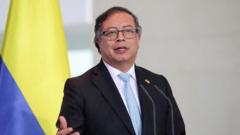In a significant escalation of diplomatic tensions, US President Donald Trump has declared a 25% tariff on all goods imported from Colombia after Colombian President Gustavo Petro denied entry to two US military planes designated for deporting migrants. The controversial move by Trump includes claims of immediate sanctions and the possibility of raising tariffs to 50% in just a week if Colombia does not comply.
President Petro, responding to the initial plans for deportation, stated that migrants should be treated with dignity and respect: "I will receive our fellow citizens on civilian planes, without treating them like criminals." His administration's stance emphasizes a more humane approach to handling deportations, contrasting sharply with Trump’s hardline policies.
Trump's rapid response included not only tariffs but also a proposed travel ban and immediate visa revocations for Colombian government officials and their supporters. This punitive stance appears aimed at signaling dissatisfaction with Colombia’s handling of migrant returns, which the US deems a violation of its legal obligations.
As a nation that significantly exports coffee, bananas, and crude oil to the US, Colombia stands to face economic repercussions from these tariffs, with consumers likely facing higher prices for these goods. This situation complicates bilateral relations, particularly as the US government has historically relied on cooperation with Colombia to manage migratory flows from the region.
Reports indicate that thousands of migrants from various countries traverse through Colombia on their journey to seek refuge in the US, often facilitated by criminal networks. This dynamic remains a contentious issue between the two nations, raising concerns about the effectiveness of Trump's administration in curtailing undocumented immigration.
Meanwhile, President Petro disclosed that over 15,666 Americans are currently in Colombia illegally, a figure that remains unverified. He further stated that he will not resort to aggressive methods to repatriate illegal US migrants, distinguishing his approach from that of the previous US administration.
The unfolding feud marks a stark contrast between US and Colombian immigration policies and highlights the complexities of international relations in an era of heightened concern over border security. With Trump advocating for robust enforcement of immigration laws, it remains to be seen how this will affect ongoing collaborations and the broader geopolitical landscape in the coming months.





















